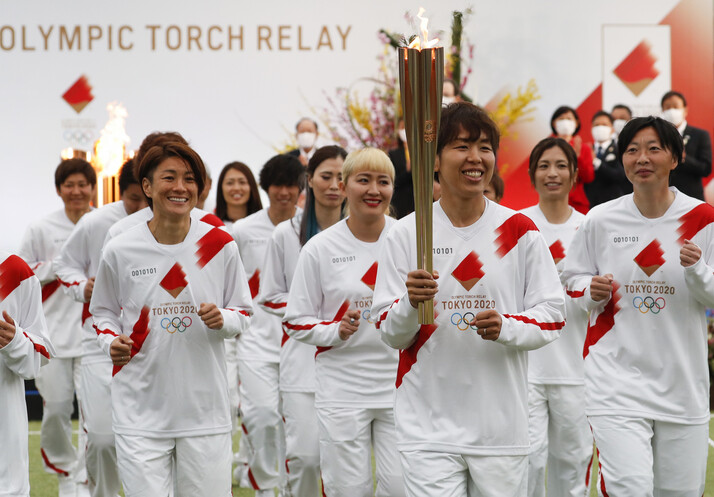First runner of the women’s soccer team who won the World Cup during the Great East Japan Earthquake
New coronavirus patients 816 → 1918 rapidly increased after emergency release

In 2011, when the Great East Japan Earthquake took place, in July of that year, the women’s soccer Japanese national team coach and 16 players who delivered their strength and courage to the Japanese people by winning the women’s World Cup in Germany are the first runners to send a torch at the J Village, a football facility in Fukushima Prefecture. Started. Fukushima/Yonhap News
At 9:40 a.m. on the 25th, a successful beacon to announce the start of the Tokyo Olympics began at J Village, a soccer facility in Fukushima Prefecture, Japan. For the first time in the history of the Olympics, the Tokyo Olympics, which were postponed for one year, took their first steps after twists and turns. The first runners of the torch relay were the coaches and 16 players of the Japanese women’s soccer team, Nadesico Japan, who won the Women’s World Cup Germany in July 2011 four months after the Great East Japan Earthquake and delivered strength and courage to the Japanese people. ‘Nadeshiko’ is a nickname for the women’s soccer team and means dianthus. “I believe that the Tokyo Olympics can give the people of East Japan courage and energy,” said Norio Sasaki, the director at the time. The athletes started to run vigorously with the torch that symbolized the cherry blossoms. The event was held on a small scale without spectators, without Japanese Prime Minister Yoshihide Suga participating, conscious of Corona 19. In his greeting, Seiko Hashimoto, chairman of the Tokyo Olympics organizing committee, said, “The world has been in a difficult situation for the past year, but the torch has been waiting for today. The torch relay is held for 121 days until July 23, when the opening ceremony of the Olympics is held. About 10,000 people run all over Japan. Grandmother Tanaka Kane, who has the world’s oldest Guinness record at 118 this year, will also participate in the torch relay in Fukuoka. Born in 1903, Grandma Tanaka goes to the torch in a wheelchair pushed by her family. The Japanese government has announced separate quarantine measures to prevent the spread of corona during the torch relay. He asked to refrain from cheering on the street and wear a mask. If crowds rush to see the torch, it was decided to stop the relay at that location and move to the next destination. Preparations for the Olympics have begun in earnest, but as the number of corona infections increases again in Japan, anxiety is growing. The number of new infections was 816 a day on the 22nd, when the emergency was completely lifted after 73 days, but the number of new infections rose to 1503 on the 23rd and 1918 on the 24th. The Japanese government is striving to host the Olympics by not only not receiving foreign audiences, but also saying that it will minimize entry to the country, including volunteers, Olympic officials, and state guests. However, 60% of the people still think that the Olympics should be’suspended or re-postponed’ due to concerns about the spread of the coronavirus, and criticism has also been raised for lifting the emergency situation due to the torch relay. A senior government official said in an interview that day, “The Olympics will be held. When the torch relay begins, it cannot be stopped any longer.” By Kim So-yeon, staff reporter
